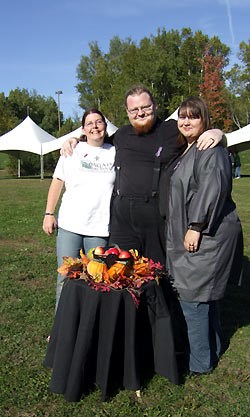Sometimes, Jen Rowe hestitates to wear her pentagram, or pentacle.
An almost-universal symbol of paganism, it's worn by many pagans as jewelry, says Jen Rowe, coordinator of the Pagan Pride celebration this past weekend.
"It's a circle with a five-pointed star inside," she says. "For most, the points represent earth, air, fire, water and spirit."
Rowe says she's not alone in her hesitation.
"Luckily in the Sault it's not too bad, but I still get very funny looks or angry mutterings from some people," she says.
Rowe says there are times and places she keeps her spiritual beliefs to herself for fear of offending someone, being put down or being discriminated against.
"I sometimes wonder if it's safe for me to be a pagan, to openly wear my pentagram, or to read tarot cards whereever I want," she says. "If other denominations can wear their holy symbols, why can't I wear my pentacle without being looked at funny?"
Rowe says there have been times reactions have been stronger than looks.
"'You're going to hell' or 'You're crazy, magic doesn't work' are some things we hear on occasion," she says.
She and other members of the Sault Ste. Marie Pagan Association held an afternoon of workshops and information sessions at Fort Creek Conservation Area last Sunday to celebrate Pagan Pride.
Rowe is seen there with Kyle Cardoza and Amanda Zuke.
Internationally, the Pagan Pride Project sponsors Pagan public Equinox rituals and charity drives every September.
"Ever since I heard about it four years ago I felt there was a need for it in the Sault," she said. "I knew there were pagans in the area who still felt that they couldn't come out of the broom closet so to speak because they were afraid of discrimination at work, that they might get in trouble, that their children might get taken away."
Rowe said that it is important for people of more mainstream faiths to see paganism as a positive, reputable and life-affirming religious and lifestyle alternative.
"I decided I would try to hold a yearly festival in conjunction with the international Pagan Pride movement to show that pagans are regular people," she said.
There are many different types of pagan, said Rowe.
Generally speaking, paganism consists of a nature-promoting, faith-based set of spiritual practices that are often polytheistic, honouring a variety of gods and goddesses, with an emphasis on goddess worship.
"A lot of pagans follow the wheel of the year [calendar], even though it's something newly created by Gerald Gardner," Rowe said. "We're trying to find and follow the old ways as much as we can, even though much has been lost, erased or just forgotten, and at the same time trying to create something new that works and isn't somehow horribly broken or biased."
The generally accepted pagan calendar is the wheel of the year and it celebrates eight festivals a year, about one every six weeks, she said.
This year's Pagan Pride events on Sunday also marked the autumn equinox festival or Mabon.
"To pagans of many different traditions this time of year is one where we count our blessings, where we are happy to see the harvest safely in and we have food for the winter," Rowe said. "In a less traditional sense, it is a time to realize all the things we did over the past year that have come to fruition for us."
How pagans celebrate this and the other seven festivals on the wheel of the year varies widely and is personal to each pagan because paganism is not an organized, structured religion, has few temples and no overarching structure, said Rowe.
There really isn't any one correct definition of a pagan and individual groups and traditions are organized in a variety of ways, from highly structured to completely anarchistic.
One of the few more widely recognized pagan churches in Canada is the Wiccan Church of Canada, a strong advocate of religious freedom.
The Wiccan Church of Canada has two temple locations, one in Toronto and one in Hamilton and it supports pagans across the Country.
It offers spiritual counselling, teaching and ritual and it seeks to provide community contacts for individuals or groups wanting to learn more about paganism in their communities.
Members of the church, which was founded in Toronto in 1979 by Richard and Tamarra James, decided to call their tradition Odyssean in recognition of the individual spiritual journey or odyssey that we each make, which is never exactly the same for any two people.
The Sault Ste. Marie Pagan Association has no official affiliation with the Wiccan Church of Canada but individual members do use resources from the church to support their everyday life as pagans.
